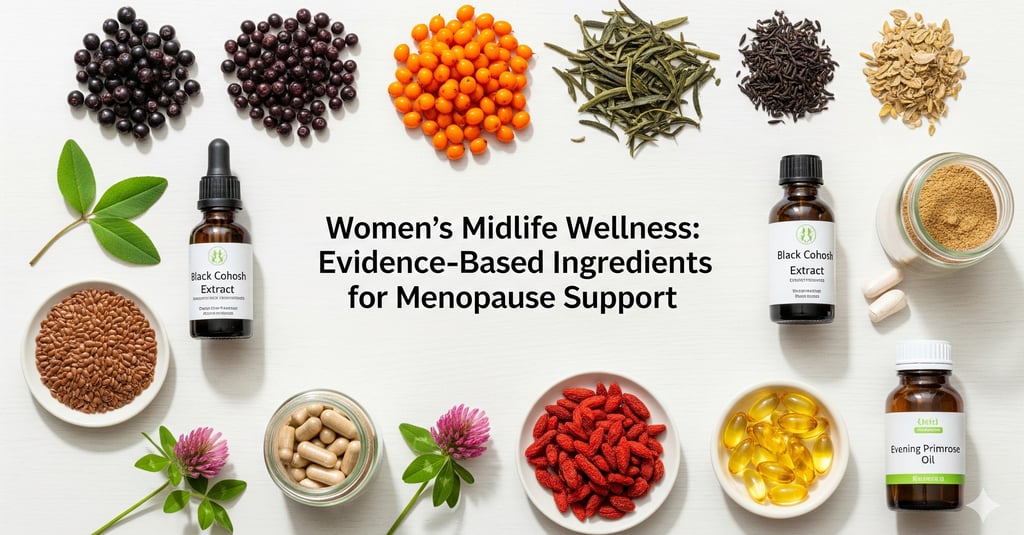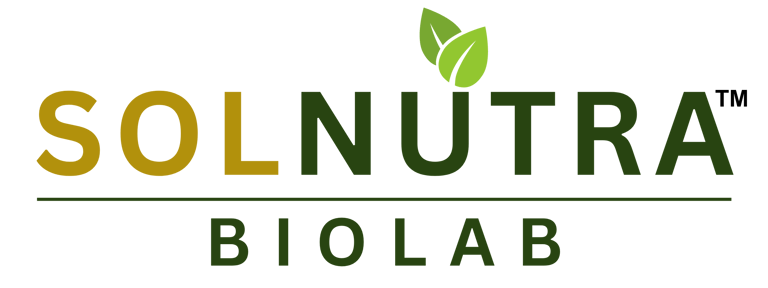Women's Midlife Wellness: Evidence-Based Ingredients for Menopause Support
8/27/20254 min read


Understanding Menopause: The Transition and Its Effects
Menopause is a natural biological process that signifies the end of a woman’s reproductive years, typically occurring between the ages of 45 and 55. It is marked by a decline in the production of hormones, particularly estrogen and progesterone, leading to various physiological changes. The hormonal fluctuations during this transition can trigger a range of symptoms that may impact a woman's daily life significantly.
Among the most commonly reported symptoms are hot flashes, which are characterized by sudden bursts of warmth, often followed by sweating. These episodes can occur at any time, disrupting daily activities and sleep patterns. In fact, sleep disturbances are frequently reported during menopause, leading to insomnia or feelings of fatigue due to inadequate rest. Such symptoms can contribute to mood swings, irritability, and anxiety, as the body undergoes these significant changes. The interplay of these symptoms can cause considerable stress, affecting both mental and physical health.
Moreover, the decline in estrogen levels during menopause can have lasting effects on various health aspects. For instance, women may experience changes in their metabolism, resulting in weight gain or difficulty in maintaining a healthy weight. Bone density is also affected, increasing the risk of osteoporosis. Women may encounter challenges related to cardiovascular health, as the protective benefits of estrogen diminish. Understanding these changes is essential for women navigating this transition, as it empowers them to seek appropriate support and explore effective wellness management strategies.
Recognizing the multifaceted nature of menopause allows women to prepare for its effects. By understanding the hormonal shifts and their implications, women can take informed steps towards managing symptoms and promoting overall wellbeing during this significant life stage.
Key Ingredients for Menopause Support
Managing menopause symptoms can be improved with several evidence-based ingredients that support women's health during this transitional phase. One notable group of ingredients comes from phytoestrogens, plant-derived compounds that mimic estrogen in the body. Soy and red clover are two widely recognized sources of phytoestrogens. Research suggests that soy isoflavones may help alleviate hot flashes and night sweats, thus improving overall comfort and sleep quality for menopausal women. Similarly, red clover has been associated with reduced frequency of these symptoms, providing a plant-based alternative that may ease the discomfort often linked with menopause.
Another essential ingredient to consider is omega-3 fatty acids, which are known for their anti-inflammatory properties. Studies indicate that omega-3s can help mitigate mood swings, anxiety, and other emotional disturbances during menopause. These beneficial fats, commonly found in fatty fish, flaxseeds, and walnuts, are critical for supporting cognitive health and overall emotional well-being, making them a valuable addition to the diet of women experiencing menopausal changes.
Additionally, vitamin D plays a crucial role in bone health, particularly as estrogen levels decline during menopause, increasing the risk of osteoporosis. Adequate levels of vitamin D can help maintain bone density and may also alleviate some depressive symptoms associated with menopause. Women are encouraged to obtain sufficient sunlight exposure or consider supplementation if necessary.
Lastly, magnesium is another vital mineral that supports relaxation and stress management. It has been shown that magnesium can assist in reducing insomnia and mood instability—common issues faced during menopause. Including magnesium-rich foods such as leafy greens, nuts, and whole grains may provide the necessary nutrients to help women navigate this life stage with greater ease.
Integrating Wellness Strategies: Diet and Lifestyle Adjustments
Embracing menopause can be a challenging transition, yet integrating wellness strategies into daily life can significantly ease the journey. A proactive approach incorporating menopause-supportive ingredients into meal planning is essential for optimizing health during this stage. Focus on a variety of foods rich in phytoestrogens, such as soy products, flaxseeds, and legumes, to help balance hormone levels naturally. By incorporating these ingredients into meals, women can experience various benefits, including reduced hot flashes and improved mood stability.
Hydration plays a pivotal role in managing menopause symptoms. Adequate water intake helps support overall health, aids in temperature regulation, and can alleviate dryness often experienced during this transition. Women should aim for at least eight 8-ounce glasses of water daily, adjusting as needed based on activity levels and climate. Herbal teas may also provide additional soothing effects, as many varieties contain ingredients known to support menopausal health.
Regular exercise is another cornerstone of effective menopause support. Engaging in physical activities, whether through aerobic exercises, strength training, or flexibility workouts like yoga, helps counteract weight gain and maintain bone density, both common concerns during menopause. Furthermore, exercise boosts mood by releasing endorphins, serving as a natural stress-reliever. Aim for at least 150 minutes of moderate aerobic activity each week, supplemented with strength training exercises at least twice.
In addition to physical wellness, stress management techniques are crucial for achieving menopause well-being. Practices such as mindfulness, meditation, and deep breathing can enhance mental health and reduce anxiety. Integrating these techniques into a daily routine empowers women, allowing them to actively manage the challenges of midlife shifts. By adopting these diet and lifestyle adjustments, women can cultivate a holistic approach to their health, flourishing during this significant life stage.
Consulting Healthcare Professionals: A Collaborative Approach to Menopause Management
As women enter the midlife stage, navigating menopause can often feel overwhelming. Therefore, seeking the guidance of healthcare professionals is crucial. A multifaceted approach involving doctors, nutritionists, and wellness coaches can significantly impact the management of menopause symptoms. Engaging in open conversations with healthcare providers fosters a collaborative environment where women can express their experiences and concerns. This dialogue is essential for individualized care tailored to specific health needs.
When approaching a doctor about menopause, it is important to prepare for the conversation. Women should consider documenting their symptoms, lifestyle changes, and questions beforehand. This preparation not only makes the consultation more productive but also ensures that personal health concerns are addressed. Many women may find it helpful to discuss various treatment options, including hormone therapy, dietary modifications, and alternative therapies. Understanding the risks and benefits associated with these options empowers women to make informed decisions about their health.
Beyond medical professionals, incorporating nutritionists and wellness coaches into the menopause management team offers additional layers of support. Nutritionists can provide personalized dietary plans that address nutritional deficiencies and support overall health during menopause. They may suggest specific foods and supplements that can alleviate symptoms like hot flashes or mood swings. Similarly, wellness coaches can assist in setting realistic health goals, promoting both physical and emotional well-being through structured fitness plans and stress management techniques.
In this transformative stage of life, personalized care is paramount. Women are encouraged to be proactive advocates for their health and wellness needs. Taking the initiative to consult with healthcare professionals leads to the development of a comprehensive approach to menopause management, promoting overall well-being during this significant life transition. By collaborating with a diverse team of experts, women can navigate this phase with confidence and assurance.
